New Amsterdam Theatre
The New Amsterdam Theatre is a Broadway theatre located at 214 West 42nd Street between Seventh and Eighth Avenues in the Theater District of Manhattan, New York City, off of Times Square. It was built in 1902–1903 and was designed by the architecture firm of Henry Hertz and Hugh Tallant;[2] the Roof Garden, where more risqué productions were presented, and which no longer exists, was added in 1904, designed by the same firm.[3][4] The remainder of the building was utilized for offices.[2]
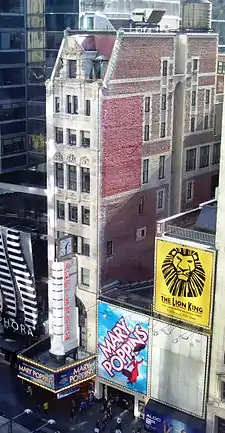 The theatre building in 2011, seen from the 9th floor of the New 42nd Street Building | |
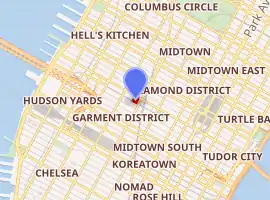
| |
| Address | 214 West 42nd Street New York City United States |
|---|---|
| Owner | City of New York |
| Operator | Disney Theatrical Group |
| Capacity | 1,702 |
| Production | Aladdin |
| Construction | |
| Opened | October 23, 1903 |
| Architect | Herts & Tallant |
| Structural engineer | DeSimone Consulting Engineers |
New Amsterdam Theatre | |
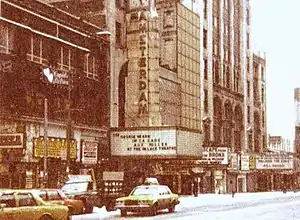 The crumbling, vacant theatre and surrounding buildings in 1985 before the renovation of 42nd Street | |
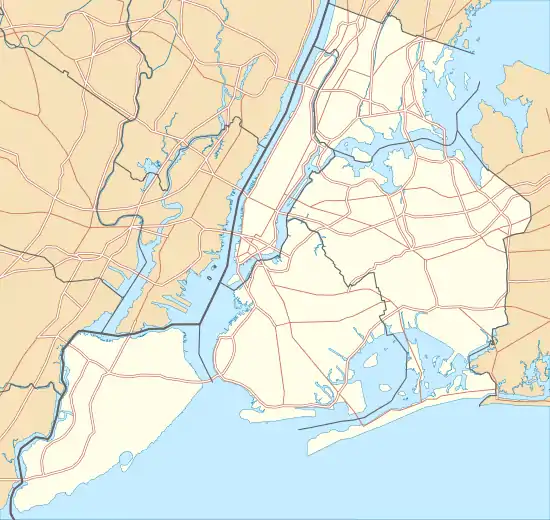   | |
| Coordinates | 40°45′21″N 73°59′18″W |
| Built | (1903) |
| Architectural style | exterior: Beaux-Arts interior: Art Nouveau |
| NRHP reference No. | 80002664[1] |
| Significant dates | |
| Added to NRHP | January 10, 1980 |
| Designated NYCL | October 23, 1979 (exterior & interior) |
| Website | |
| http://www.disneyonbroadway.com | |
From 1913 to 1927, the theatre was the home of the Ziegfeld Follies, whose producer, Florenz Ziegfeld, Jr., maintained an office in the building, and operated a nightclub on the roof.[2] George White's Scandals and Eva LeGallienne's Civic Repertory Theatre were subsequent tenants. It was used as a movie theatre beginning in 1937, closed in 1985, and was leased by The Walt Disney Company and renovated by Hardy Holzman Pfeiffer in 1995–97 to be the flagship for Disney Theatrical Productions presentations on Broadway.[3]
Both the Beaux-Arts exterior and the Art Nouveau interior of the building are New York City landmarks, having been designated in 1979.[3][4] In addition, the building was added to the National Register of Historic Places in 1980.
Along with the Hudson and Lyceum Theatres, also built in 1903, the New Amsterdam is one of the oldest surviving Broadway venues.
Construction and original run
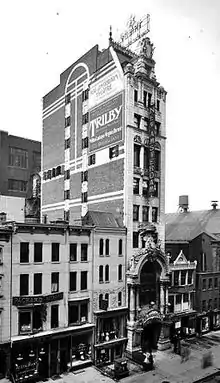
The Beaux-Arts facade[3] of the New Amsterdam is a narrow slice which leads to the theatre's interior, the first concrete example of architectural Art Nouveau in New York.[5] The building was constructed in 1902–03[3][4] by the partnership of impresarios A.L. Erlanger and Marcus Klaw, was designed by architects Herts & Tallant.[6] Decoration was carried out by an extensive team of painters and sculptors that included George Gray Barnard, Robert Blum, the brothers Neumark, George Daniel M. Peixotto,[7] Roland Hinton Perry and Albert Beck Wenzell. At the time of construction, it was the largest theatre in New York, with a seating capacity of 1,702.
The theatre opened October 23, 1903 with a production of Shakespeare's A Midsummer Night's Dream. For many years, it hosted the Ziegfeld Follies, showcasing such talents as Fanny Brice, Bert Williams, Will Rogers, Eddie Cantor, W.C. Fields, Marilyn Miller, Van and Schenck, Helen Morgan, Sophie Tucker, Eaton siblings and silent film star Olive Thomas whose ghost supposedly haunts the theatre.[8]
A racier sister show of the Follies, the Midnight Frolics, played in the New Amsterdam's Roof Garden theatre. The New Amsterdam was the scene of Marilyn Miller's greatest triumphs in the musicals Sally (1920) and Sunny, which opened in September 1925 co-starring Clifton Webb as Harold Wendell-Wendell and ran for three seasons.[9] But the theatre also hosted serious productions, and in June 1927 Basil Rathbone appeared there as Cassius in Julius Caesar.[10]
The premiere of the Jerome Kern and Otto Harbach scored Roberta starring Bob Hope, George Murphy, Fay Templeton and Lyda Roberti opened at the New Amsterdam November 18, 1933.
Restoration
The Great Depression did much harm to the legitimate-theatre business, and in 1936 the New Amsterdam closed. It reopened on a limited basis in 1937 but was soon converted to a movie theatre. The New York City Industrial Development Corporation raised a US$4 million bond issue to purchase the property in 1982 and retained title while responsibility for development and bond payment rested with the Nederlander Organization.[11] In 1984, the Empire State Development Corporation and New York City Economic Development Corporation purchased the property.[12] After having spent US$15 million on the property, Nederlander announced in 1990 that it did not consider restoration of the property to be economically feasible; thereafter in 1992, a settlement was reached where the New York State Urban Development Corporation would take ownership and begin "structural stabilization" immediately through the 42nd Street Development Project.[11]
During its years as a movie theatre, the Roof Garden was used as a rehearsal space for a number of shows, including the original Broadway productions of My Fair Lady, Gypsy and Camelot. In 1936, the theatre staged its last play, Sigmund Romberg's Forbidden Melody, until Disney control.[13]
Disney Theatrical Productions signed a 49-year revenue-based lease for the property in May 1995, with Disney Development restoring the building.[14] The theatre, which had recently been used as a filming location for the movie Vanya on 42nd Street, was dilapidated; it would take several years, and millions of dollars, to restore it to its original use and grandeur. The roof garden remained closed when inspectors discovered that it could not meet modern building codes.
The New Amsterdam was officially reopened on April 2, 1997. In November 1997, after the premiere of the film Hercules and a limited engagement of a concert version of King David, Disney's stage version of The Lion King opened. On June 4, 2006, The Lion King closed in The New Amsterdam Theatre, moving two blocks uptown to the Minskoff Theatre on June 13, 2006. Mary Poppins began previews at the New Amsterdam Theatre on October 16, 2006 and opened on November 16, 2006,[15] where it continued to run until March 3, 2013. The theatre was renovated to accommodate Disney's Aladdin, which was mounted in the theatre in 2014.
In 2008, The Roof Garden and 42nd Street office tower were renovated to become the home offices for Disney Theatrical Productions.
Box office record
.jpg.webp)
Aladdin broke the house record at the New Amsterdam Theatre for the week ending August 10, 2014, with a gross of $1,602,785. Aladdin also holds the current record for the New Amsterdam Theatre, grossing $2,584,549 over nine performances for the week ending December 30, 2018.[16] The previous record of $1,587,992.50 was set by Mary Poppins for the week ending December 30, 2007.[17]
Events
The New Amsterdam has also hosted events benefitting Broadway Cares/Equity Fights AIDS, including the annual Easter Bonnet Competition, until the event moved to the Minskoff Theatre. The New Amsterdam is now home to BC/EFA's annual Red Bucket Follies (formerly known as Gypsy of the Year Competition), the fall/winter sister event to the Easter Bonnet. In recent years, the benefit's honored guest had been centenarian Doris Eaton Travis, who originally performed on the New Amsterdam stage in the Ziegfeld Follies of 1919.
In 1999, the Backstreet Boys televised a concert for Disney Channel called Backstreet Boys In Concert from the New Amsterdam Theatre. It was a prelude to their 1999-2000 Into the Millennium Tour.
References
Notes
- "National Register Information System". National Register of Historic Places. National Park Service. March 13, 2009.
- Alexander, Cathy. "New Amsterdam Theatre" in Jackson, Kenneth T., ed. (2010). The Encyclopedia of New York City (2nd ed.). New Haven: Yale University Press. ISBN 978-0-300-11465-2., pp.888-89
- New York City Landmarks Preservation Commission; Dolkart, Andrew S.; Postal, Matthew A. (2009). Postal, Matthew A. (ed.). Guide to New York City Landmarks (4th ed.). New York: John Wiley & Sons. ISBN 978-0-470-28963-1., p. 88
- White, Norval & Willensky, Elliot (2000). AIA Guide to New York City (4th ed.). New York: Three Rivers Press. ISBN 978-0-8129-3107-5., p. 256
- Waters, Theodore "The New Amsterdam Theatre: A triumph of the new art", Everybody's Magazine (July–December 1903) pp 488
- Winnicka, Ewa (2013). Nowy Jork zbuntowany. Miasto w czasach prohibicji, jazzu i gangsterow. PWN. p. 146.
- The Jewish Encyclopedia: "Peixotto"
- Neibaur, James L. "The Olive Thomas Collection".
- Parker, John (ed), Who's Who in the Theatre, 10th revised edition, London, 1947: 1429
- Parker, John (ed), Who's Who in the Theatre, 10th revised edition, London, 1947: 1184
- Dunlap, David. "State Acquires Landmark Theater to Salvage While It Still Can" The New York Times (September 10, 1992)
- Eltman, Frank (March 31, 1995). "Disney opens on Times Square". Indiana Gazette. Associated Press. p. E-3. Retrieved April 7, 2018 – via Newspapers.com.
- "Resurrection of 42nd Street". Broadway: The American Musical. PBS. September 27, 2012. Retrieved July 23, 2019.
- Kennedy, Shawn G.; Lesser, Ellen C. (May 12, 1995). "Disney and Developer Are Chosen To Build 42d Street Hotel Complex". New York Times. p. B2. Retrieved July 30, 2015.
- Staff. "The Lion King is moving theatre" Archived 2010-01-25 at the Wayback Machine New York Theatre Guide (June 2, 2006)
- , Production Gross, Playbill.com
- Cox, Gordon. "Broadway Box Office: ‘Aladdin’ Makes Magic for Disney", Variety (August 11, 2014)
Further reading
- Henderson, Mary C. (1997). The New Amsterdam: The Biography of a Broadway Theatre. New York: Hyperion. ISBN 0-7868-6270-X.
- Morrison, William (1999). Broadway Theatres: History and Architecture. Mineola, N.Y.: Dover Publications. ISBN 0-486-40244-4.
- Pearson, Marjorie (1979). New Amsterdam Theatre Designation Report (PDF). New York City Landmarks Preservation Commission. Archived from the original (PDF) on 2016-03-03. Retrieved 2014-06-12.
- Travis, Doris Eaton; Eaton, Joseph; Eaton, Charles (2003). The Days We Danced: The Story of My Theatrical Family from Florenz Ziegfeld to Arthur Murray and Beyond. Seattle: Marquand Books. ISBN 0-8061-9950-4.
- "The New Amsterdam Theatre". Architects' and Builders' Magazine. Vol. 5 (Old Series 36) No. 5: 186–192. February 1904.
External links
| Wikimedia Commons has media related to New Amsterdam Theatre. |
- Official website
- New Amsterdam Theatre at the Internet Broadway Database
- Disney On Broadway Podcast: Olive Thomas: Disney's Resident Ghost
- Broadway Theatre Guide with full show details for the New Amsterdam Theatre
- Chronology at the New 42nd Street site
- A collection of New Amsterdam memorabilia
- "New Amsterdam Theatre (New York, N. Y.)" Museum of the City of New York (pictures)
- "Images related to New Amsterdam Theatre". NYPL Digital Gallery.

